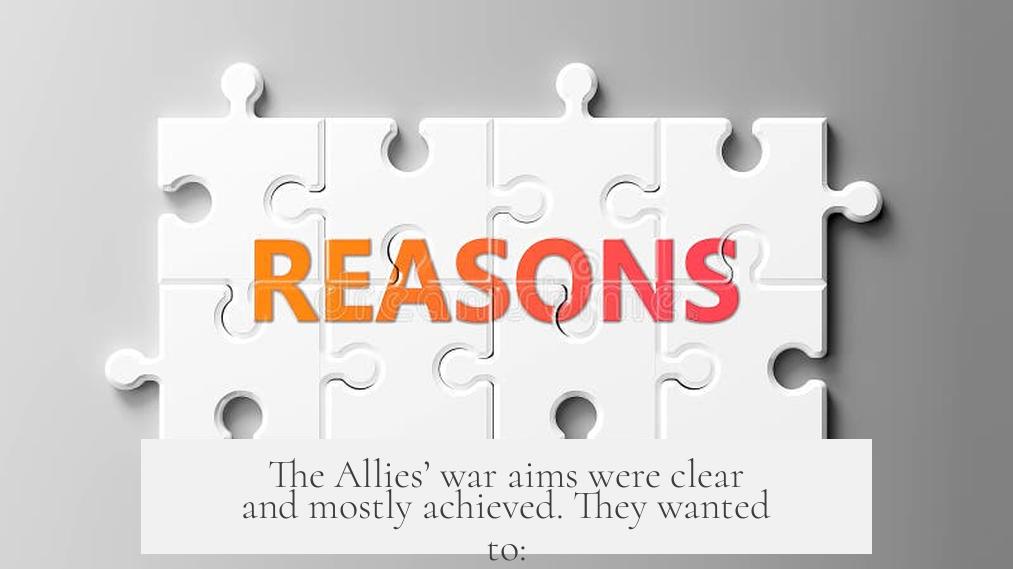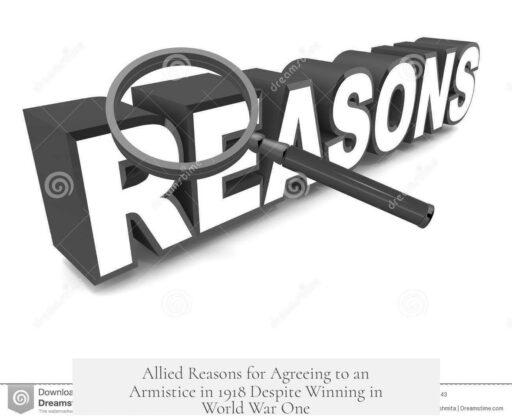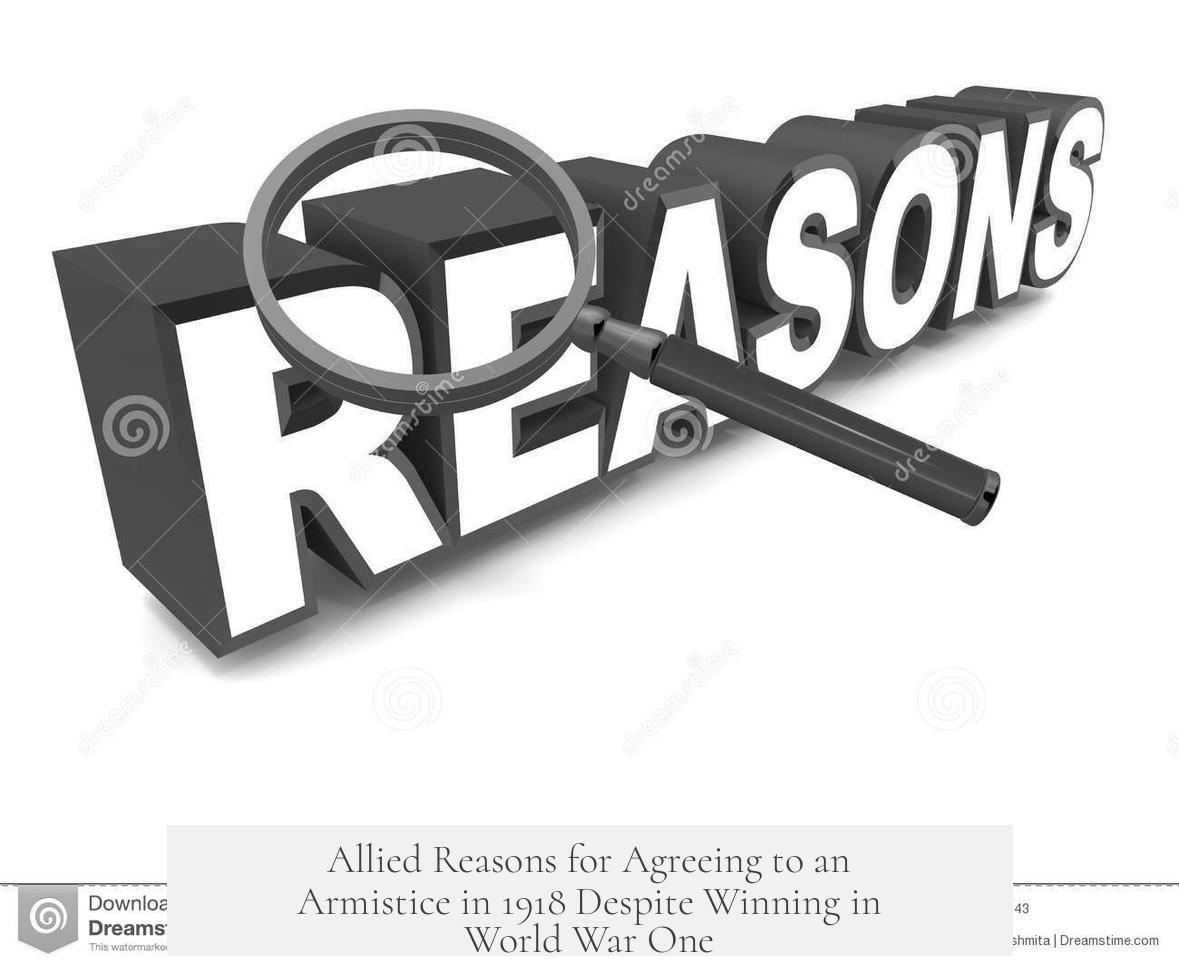The Allies agreed to an armistice in 1918 despite their military advantage because their core objectives were fulfilled, they sought a stable Germany to prevent chaos, and exhaustion and political strategy guided their decision. The German military was defeated, the Allies had achieved their goals, and prolonged conflict risked destabilizing Europe and undermining reconstruction efforts.

By late 1918, the Allied forces had pushed German armies back from occupied territories. They regained key regions like Alsace-Lorraine and forced Germany to accept harsh limits on its military. The German aristocracy, including Kaiser Wilhelm II, had stepped down. The German population was in turmoil—revolutions swept Berlin and other regions, with various factions fighting for control. The German military and navy were in mutiny. Some provinces, such as Bavaria, declared independent Soviet republics. Amid civil unrest and military collapse, Germany requested the armistice, accepting total and unconditional surrender.
The Allies’ war aims were clear and mostly achieved. They wanted to:

- Expel German forces from occupied lands
- Recover lost regions such as Alsace-Lorraine
- Enforce reparations to rebuild war-torn Europe
- Limit Germany’s military capacity to prevent future aggression
- Promote democracy to block aristocratic militarism
Beyond military victory, maintaining a strong, economically viable Germany was essential. France, Britain, and others recognized Germany’s industrial power as crucial for European recovery. The region’s wealth, including German industry intact, was needed to pay reparations. France’s industrial heartland had suffered years of occupation and looting. Belgium was devastated. British creditors depended on German economic revival. Dragging the war could cause Germany to fragment and descend into prolonged anarchy. Violent street fights between Freikorps, communists, and revolutionaries threatened the fragile peace.
Marshal Ferdinand Foch, commander of the Allied armies, underscored this logic. He viewed war as a means to impose the victor’s will rather than an end in itself. With the German army defeated, continuing the conflict would mean needless bloodshed without added benefit. Germany’s request for an armistice in November 1918 demonstrated their total defeat. Foch later blamed the Treaty of Versailles, not the armistice, for undermining Allied victory by introducing harsh terms that ultimately fostered resentment.

Moreover, the human and economic costs weighed heavily on the Allies. France and Britain faced exhaustion after four brutal years. They worried that prolonged fighting deep into Germany’s territory would increase American influence in peace negotiations, diluting their own power. The armistice offered a way to end hostilities swiftly and consolidate gains without risking further destabilization or political disadvantage.
Key takeaways:

- Allied war aims—territorial recovery, military limitation, reparations, and democracy—were achieved by late 1918.
- Maintaining a strong, unified Germany was seen as essential for European economic recovery and stability.
- The German military collapse forced their leaders to accept unconditional surrender.
- Marshal Foch emphasized victory was secured; further fighting was unnecessary bloodshed.
- Allied exhaustion and political concerns influenced the decision to accept the armistice.
In World War One, why did the Allies agree to an armistice in 1918, if they were finally winning?
The Allies agreed to the armistice in 1918 despite their winning position because their goals had been met, and pressing on risked breaking Germany in ways that would harm Europe’s economic future and political stability. It wasn’t just about beating Germany on the battlefield; it was about shaping a manageable peace. Let’s dive into why calling it quits early made strategic sense.

Imagine winning a tough match but realizing that winning by a knockout might hurt the whole league’s livelihood. That’s a bit what happened here.
A Strong Germany Was Still Needed

The Allies, surprisingly, wanted Germany to remain strong enough to stand after the war. Even France, their immediate historical rival, kept this in mind. Early on, some leaders toyed with the idea of breaking Germany apart. But that plan soon proved a non-starter.
Why? Well, Germany was a massive industrial powerhouse, the third-largest economy globally back then. Scrambling it into pieces would’ve wrecked not only Germany but the entire European economy. Also, the richest part of France—the industrial heartland—had suffered four years of occupation and plunder. Belgium lay in ruins. Funding reconstruction needed a solvent Germany.

The British especially relied on German industry to pay reparations and, frankly, to rebuild themselves. Britain went from being the world’s top creditor before the war to its largest debtor during those four years.
What if the war had dragged on? Germany’s internal situation would have gotten even worse. Bavaria briefly became a Soviet-style republic. Radical groups—Freikorps, communists, revolutionaries—were already battling in streets. Berlin was simmering with unrest. Losing control could turn Germany into a fractured chaos, unsafe for Europe as a whole.
Achieving War Goals Made Further Fighting Unnecessary
The Allies had clear, achievable goals. Push Germany out of occupied lands, possibly reclaim Alsace-Lorraine, neutralize its military might, and ensure reparations were paid. Plus, they wanted democracy to replace an old aristocratic regime steeped in militarism.
By November 1918, all these aims were met. The German leadership, including Kaiser Wilhelm II, stepped down and fled. The army surrendered seriously—no half-hearted truce here. German troops, the navy, and revolutionaries across Germany were in turmoil. Parts of Germany, like Poland-influenced regions, were already breaking away.
The German army was cut down to a tiny 100,000 soldiers. Reparations were about to start. And the political landscape inside Germany had shifted dramatically.
Given all this, what else was there to fight for?
Marshal Foch’s Wise Perspective
Marshal Ferdinand Foch, the Allied Commander-in-Chief, had a clear way of putting things: war is a tool to impose your will, not an end to glorify violence for its own sake. The German army was already defeated in the field, so why continue the brutal slaughter toward Berlin?
Foch believed the armistice marked the victory. Germany admitted defeat by requesting peace, cutting off any military resistance. The real problem wasn’t signing the armistice but what came afterward—particularly, the Treaty of Versailles, which, according to Foch, “robbed the Allies of their victory.”
So the armistice wasn’t surrender; it was the handshake after a clear battlefield win.
Exhaustion and Political Realities Played a Role
By late 1918, Allied soldiers and governments were drained. France and Britain had poured immense blood and resources into the war. The U.S. was the fresh party, but British and French leaders worried that dragging on would let America dominate peace talks more than they wanted.
The armistice shocked everyone but gave a needed breather. Leaders took a leap of faith to grab peace now rather than chase uncertain gains.
Putting It All Together
The decision to sign the armistice in 1918 wasn’t about giving up on victory. Instead, it was about securing the conditions for a stable peace after a hard-fought win. The Allies were practical, focused on rebuilding Europe’s shattered economy and preventing chaos in Germany.
They understood that continuing the war risked breaking the German state entirely, which would be bad for everyone. Instead, they wanted a weakened but functional Germany to pay, rebuild, and hold itself together politically.
Imagine if the Allies had pushed all the way to Berlin with full military occupation. They might’ve crushed Germany, but the resulting power vacuum could have unleashed even greater instability—think civil wars, communist uprisings, or separatist breakaways across Europe.
So, the armistice was a calculated, responsible move to end hostilities while preserving longer-term order.
Lessons From History
- Victory is more than battlefield success. Sustainable peace requires balancing military outcomes with economic and political realities.
- Pragmatism beats stubbornness. Even when winning, understanding your enemy’s internal dynamics can save future headaches.
- Post-war treaties matter. Foch’s foresight about Versailles hints that winning a war is only part of the story; how peace is structured afterward influences future stability.
Ever wonder how different Europe would look today if the Allies had shattered Germany beyond recognition? It’s a classic history twist showing that even victors must sometimes stop at just the right time.




